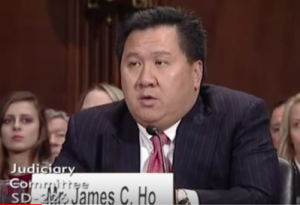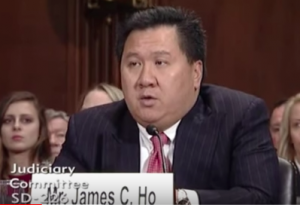
(via YouTube)
When anti-abortion activists filed a lawsuit in Amarillo, Texas seeking to overthrow federal drug regulation nationwide, they understood that there was a 100 percent chance that they would end up with Christian legal activist turned Trump Judge Matthew Kacsmaryk. It worked out for them.
This ruling dealt a brutal blow to the public’s faith in the judiciary, ultimately inspiring the Judicial Conference, the body representing the leadership of the federal court system, to recommend that cases seeking national or statewide injunctions be randomly assigned on a district-wide basis to prevent the appearance of impropriety. A rational proposal that imposed no significant burden on anyone and the most dedicated Federalist Society judges in the country, who see small divisions less as vital access points for justice in remote areas than supercharged political judgeships allowing litigants to game the judge selection process, responded by telling the leadership to pound sand.
Leading the pushback against the potential end of the right-wing gravy train was the Fifth Circuit’s Judge James Ho. His initial comments were fraught with contradictions and bad faith comparisons, but with the benefit of time he’s now refined his stance into a longer, more detailed compilation of contradictions and bad faith comparisons.
Judge Ho laid out his opposition to the forum shopping rule in a jumbled mess of remarks to the Midland County Bar Association a couple days ago.
But lately, some critics of the judiciary have chosen to bemoan, rather than celebrate, the fact that many Americans across the country are served by a single, local federal district judge.
So many grossly misleading claims for such a short sentence.
First of all by “critics of the judiciary” he means the Judicial Conference. Maybe he sees the Chief Justice and Sixth Circuit Chief Judge Jeffrey Sutton as self-hating jurists, but rebranding the leadership of the federal judiciary — Republicans, no less — as mere “critics of the judiciary” like they’re campus anarchists or something is just transparent nonsense.
Moreover, no one bemoans the existence of single judge courthouses to serve remote communities or there would be a palpable movement to crack and pack courthouses like gerrymandering congressional districts. If anything, the Judicial Conference’s proposal sought to protect the rapidly eroding credibility of those judges.
Judge Ho drapes his talk in rhetoric about a single judge being a “member of their community” and the burden on poor, rural folks forced to “litigate before a judge who lives hundreds of miles away,” even though the case we’re all talking about — the mifepristone ban — didn’t involve humble townsfolk, it was brought by FIVE OUT OF STATE GROUPS who incorporated a new entity in Amarillo mere months before filing the case for the sole purpose of bringing this matter in front of the judge they wanted.
Under this proposal, citizens in the Panhandle will more likely than not be forced to litigate their rights before a federal judge 400 miles away in Dallas.
The proposal was limited to cases seeking national or statewide injunctions. So, no, citizens in the Panhandle are not “more likely than not” litigating in Dallas because citizens in the Panhandle with business before the federal courts are more likely than not NOT asking a judge to overrule the scientific conclusions of FDA medical scientists on the strength of his JD.
Indeed, the only Amarillo litigant more likely than not to be forced to THE BIG CITY under the rule would be a group like Alliance for Hippocratic Medicine that’s actually made up of a bunch of big city activists carpetbagging into the Panhandle to make a mockery of small town legal needs.
We shouldn’t impose greater burdens or different rules on Americans, just because they live outside our Nation’s largest urban centers. The Constitution protects every citizen—not just those who live in big cities.
More of the BS. He knows the plaintiffs are a fictional entity established at the behest of outside activists. He just thinks the rest of you are too stupid to figure that out.
I’ll begin by stating the obvious. There’s nothing inherently wrong or suspicious about the fact that some judicial divisions in our federal system have only one resident district judge.
I spend many of my weekends in a small, one stoplight town in Texas. We have just one supermarket in that town.
Now, do I immediately assume that something illegal or untoward has happened, just because there’s only one supermarket? Some blatant violation of federal antitrust law?
Of course not. It just means the town only needs one grocery store—not two.
And just as one grocery store doesn’t mean monopolization, one federal district judge doesn’t mean corruption.
The more apt analogy would continue to note that big city headquartered supermarket charging the residents of this town triple. You don’t “immediately assume” illegal behavior because there’s one supermarket, but once it starts extracting monopolistic rents from the locals, it progresses from an assumption to reality. Likewise, no one “immediately assumes” a problem with single judges until wingnut lobbying interests flock to that district to create sock puppet plaintiffs.
Ho wants to reframe the discussion as an attack on the existence of single judge courthouses as opposed to the exploitation of that arrangement so he just ignores the second half of the problem.
But, hey, the DOJ forum shops too!
That’s not even the highest profile example of recent forum shopping by DOJ. Last year, DOJ filed suit against Texas, challenging the State’s efforts to secure the border in Del Rio.
There’s a federal court in Del Rio. And other similar suits have been filed in Del Rio.
Yet DOJ filed in Austin—not Del Rio. It’s pretty obvious that DOJ’s choice of forum was strategic. And it has not gone unnoticed. One district judge pointedly observed that “the United States sued Texas related to events occurring in the Western District of Texas’s Del Rio Division, but it chose to bring suit over 200 miles away in the Austin Division.”
I don’t expect Attorney General Garland to punish these DOJ lawyers for blatant forum shopping, either.
This is a stupid analogy because suing the state government of Texas in the capital of Texas actually is the right venue.
But… sure. Let’s play with the facts a little and assume the DOJ tried to enjoin Texas state law by filing in San Antonio or something. The DOJ shouldn’t be able to bypass a relevant federal judge in that district just by filing 200 miles away. As the Judicial Conference eloquently put it when unveiling this proposal, the courts embrace random judge assignment to promote the appearance of fairness and those seeking national or statewide injunctions cynically undermine that when they intentionally seek out divisions where they can game the assignment process. AND THIS GOES BOTH WAYS! Make that case go to the district-wide wheel too.
It’s because, if you file in the San Francisco Division of the Northern District of California, or in the Greenbelt Division in Maryland, you have a 100% chance of drawing a judge appointed by a President of a particular party.
It’s inevitable that lawyers will try to predict which strategies will best serve their clients. It’s what we expect in an adversarial system of justice, in which Congress gives plaintiffs the flexibility to select their venue, under the laws that organize our federal judiciary.
Shorter Ho “we live in a government of men and women, not laws.” A federal judge saying, “look, litigants try to cheat because judges are nakedly political and everyone should just deal with it” should be a much bigger story. He also doesn’t really believe this, he just knows that this model cuts in favor of his political preferences because ONLY rural areas present this potential exploit and a combination of geography and blue slips make this particular cheat code overwhelmingly favor his cronies.
But, fine, Judge Ho thinks forum shopping is good advocacy actually.
So if there’s a real concern about forum shopping in our country, it’s that certain judges aren’t just taking cases as they come. The concern is that some judges are trying to direct which cases they get. And that they’re tilting their decisions in order to attract the cases they most want.
Some people use the term “forum shopping.” But the real concern may be what academics call “forum selling.” And it’s a concern that I take very, very seriously.
Narrator voice: Judge Ho does not take this concern seriously.
Few judges in the country have more aggressively sold their forum than Judge Kacsmaryk and in any event the only actionable solution to for forum selling is to water down the odds of litigants picking their judges.
Legal academics have written extensively about the extreme and egregious problem of forum selling by federal bankruptcy courts. One law professor even wrote a whole book about it. He called it: Courting Failure: How Competition For Big Cases Is Corrupting the Bankruptcy Courts.
Bro, you’re the one who just argued that forum shopping is good, strategic advocacy. Now you’re listing a bunch of abuses that can happen when litigants think they can game the system? Far be it from me to give Ho a helping hand with a free lesson is rudimentary argumentation, but you don’t actually need to make every argument, if it undermines your best argument.
As for bankruptcy forum shopping being bad… then expand the pool for that too? Saying that bankruptcy and patent forum shopping (which he also rails against) are bad too isn’t an argument AGAINST the injunction forum shopping rule, it’s a non-sequitur.
Speaking of non-sequitur reasoning:
It’s the same thing when critics accuse certain Supreme Court justices of being unethical. They don’t attack other justices who engage in the same behavior—they applaud them, because they like their rulings.
This is a not-so-subtle reference to Clarence Thomas, who Judge Ho defended with the curious reasoning that some justices own stocks and therefore taking hundreds of thousands in undisclosed gifts, a free house and tuition for family, and an RV from activists is just the same thing.
Anyway, back to the forum shopping:
Why is it ignoring robust bipartisan opposition to forum selling in our Nation’s bankruptcy and patent courts—and instead catering only to a narrow set of concerns at one end of the political spectrum?
Because courts are already taking action to combat those forms of forum shopping/selling without national intervention. The Western District of Texas had the most notorious IP shopping issue and took it upon itself to solve it. The solution? RANDOM DISTRICT-WIDE ASSIGNMENT.
It’s almost as though the Judicial Conference took action on the issue with the most devastating negative impact on public trust and where they had the least confidence that FedSoc functionaries like Ho and Kacsmaryk would act in the best interest of the rule of law.
In this vein, he complains about the existence of nationwide injunctions outright, a right-wing hobby horse based on shoddy research that also fails to address the statewide injunction issue that the Judicial Conference proposal includes.
But assuming that neither Congress nor the Supreme Court will take action to stop nationwide injunctions or agency vacatur, all is not lost. In fact, we already have a solution readily available and on the books today.
It’s called—appellate review.
Newsflash: appellate review exists now and has not solved the problem.
This failure is a product of Ho’s intentionally obtuse recasting of this as a complaint about the existence of small courthouses. Appellate review solves the risk of a lone federal judge continually botching the law — as the Eleventh Circuit can sadly confirm — but not the credibility hit the judiciary takes when national rights are getting gamed.
If we cater to the forum shaming strategies of the critics, then we’re no better than the forum-selling judges who distort their rulings to attract bankruptcy and patent cases. Whether we distort rules to attract cases or appease critics, we’re committing the same sin.
So… if we eliminate the incentives for forum shopping, then we’re no better than judges allowing bankruptcy and patent forum shopping to go unchecked… which we shouldn’t allow… but also we shouldn’t do anything about?
You know, there’s a reason why some of the most egregious assaults on the rule of law come in unexplained shadow docket opinions. The justices realize that when it comes to defending the indefensible, shutting up is free.
Judge James C. Ho’s Remarks to the Midland County Bar Association [Volokh Conspiracy]
Earlier: Judicial Conference Shocked SHOCKED To Find Forum Shopping In This Establishment
Right-Wing Judges Rage Over Anti-Forum-Shopping Rule Because Hit Dogs Holler
Chief Justice Roberts Tried To Save The Credibility Of The Judiciary, But Some Judges Just Want To Watch The World Burn
 Joe Patrice is a senior editor at Above the Law and co-host of Thinking Like A Lawyer. Feel free to email any tips, questions, or comments. Follow him on Twitter if you’re interested in law, politics, and a healthy dose of college sports news. Joe also serves as a Managing Director at RPN Executive Search.
Joe Patrice is a senior editor at Above the Law and co-host of Thinking Like A Lawyer. Feel free to email any tips, questions, or comments. Follow him on Twitter if you’re interested in law, politics, and a healthy dose of college sports news. Joe also serves as a Managing Director at RPN Executive Search.


